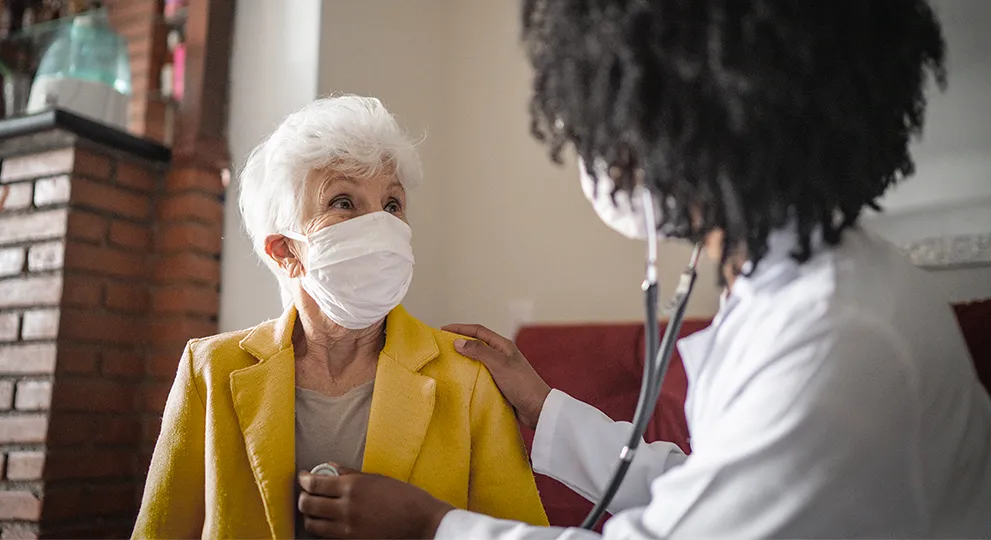15 Common Cancer Words
15 Common Cancer Words

Living with cancer can be confusing. When you’re talking to your doctor, caregiver or friends, you may hear words that you don’t understand. At times, it may seem like they’re speaking another language. Learning these common cancer words may help you better understand your diagnosis. It can also help you be an active participant in your cancer care.
Below is a list of common words you will probably hear or have already heard during your cancer journey. Here you can find these terms in note card form, along with a few extra blank cards. Feel free to fill them out online or even print and bring them with you to your next appointment. By learning these words, we hope it helps you have better conversations with your treatment team, caregiver and loved ones.
- Biomarkers—Cancer biomarkers are substances in your blood, tissues or other body fluids that can be used to help figure out the appropriate treatment for you.
- Benign—When a tumor or growth is benign, it means that it is not cancerous. Another word that means the same thing as “benign” is “nonmalignant.”
- Biopsy—A biopsy is a procedure performed by a doctor where cells or tissue is removed from the body and looked at to find out if a disease, such as cancer, is there. If the cells are cancerous, the biopsy results can show what type of cancer it is.
- Clinical trials—Clinical trials are research studies that involve people. Through clinical trials, doctors determine whether new medical approaches are safe and effective.
- Grade—Cancer grade is based on how different the tumor cells and tissue look compared to normal cells and tissue under a microscope. “Low grade” usually means the cancer cells look close to normal and tend to grow and spread slowly. A cancer’s “grade” is different from its “stage,” which measures how far the cancer has spread.
- Stage—Cancer stage describes how much cancer is in the body and how far it has spread. The staging is usually based on tumor size, whether lymph nodes contain cancer and whether the cancer has spread from its original location. A cancer’s “stage” is different from its “grade,” which measures how abnormal the tumor cells and tissue look.
- Imaging—Imaging is a way to take pictures of the inside of the body to help screen for cancer, diagnose, plan treatment, see how a treatment is working or monitor cancer. Examples of imaging tests include x-rays, computed tomography (CT), magnetic resonance imaging (MRI), positron emission tomography (PET) and ultrasounds.
- Lymphedema—Lymphedema is lymph fluid build-up in tissues that may cause swelling. This may happen if the lymph nodes are damaged or removed as part of cancer treatment or because of the cancer itself.
- Malignant—A malignant tumor means that cancer cells have been found inside the tumor.
- Margins—Margins refer to the tissue around a tumor after it has been removed. If the margin is “negative,” this means it’s likely that all the cancer has been removed. If the margin is “positive,” this means not all the cancer has been removed.
- Metastasis—Metastasis happens when cancer spreads from where it first started to another part of the body. Even though it’s in another part of the body, it’s still the same kind of cancer, so the name doesn’t change. It is also referred to as “metastatic cancer.”
- Recurrence—Recurrence is when cancer returns after some time.
- Remission—Remission occurs when there is a decrease in the signs and symptoms of cancer. There are two types of remission—partial and complete.
• Partial remission—Partial remission means that some signs and symptoms of cancer have disappeared.
• Complete remission—Complete remission means all signs and symptoms of cancer have disappeared, although cancer still may be in the body. - Treatment cycle—A period of treatment followed by a period of rest (no treatment) that is repeated on a schedule.
- Tumor—A tumor is a lump of tissue inside the body that forms when cells grow more than they should or aren’t dying when they should. A tumor may be benign or malignant.
To look up words on your own, Cancer.gov has an online dictionary of cancer terms where you can search for words or look them up alphabetically. But remember to always ask your doctor to explain any words you don’t know. Doctors are used to saying certain words and may not realize they’re hard to understand. You are your own best advocate. You deserve to have all the information you need to understand living with the cancer.













